

Connectivism. In his reflection on the first week of #cfhe12, Bryan Alexander looks at the continued fervor behind MOOCs, as well as the focus of economics in the initial discussions coming from #cfhe12.
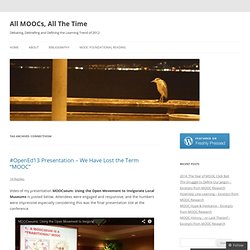
Bryan somewhat laments the lack of discussion on other elements, such as technology. Looking at his perspective, I came to grips with frustration about several topics so far lacking in the class discussion, specifically learning theory and pedagogy. And first off, there is a difference between learning theory and pedagogy…as one has to deal specifically with the way in which people learn, and the other is in relation to the methods and manners in which people teach. cMOOCs are often based on connectivism, a theory in which learning is based on the connective networks of individuals and content rather than held in brains by people (that is a crude definition; I have yet to fully read Siemens’ writing on the topic).
Pedagogy is the art, science and/or act of teaching. OLDaily ~ by Stephen Downes. November 15, 2012 PresentationSustainability and MOOCs in Historical Perspective Stephen Downes, November 15, 2012, Simposio Internacional Estado Actual Y Prospectiva De La Educacion Virtual, Bogota, Colombia.
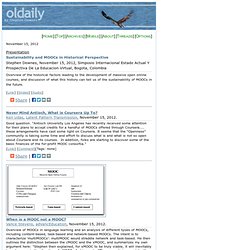
MOOCs are really a platform. We can officially declare massive open online courses (MOOCs) as the higher education buzzword for 2012.
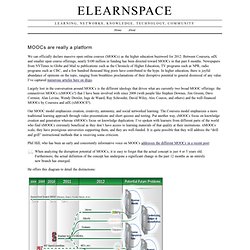
Between Coursera, edX and smaller open course offerings, nearly $100 million in funding has been directed toward MOOCs in that past 8 months. Newspapers from NYTimes to Globe and Mail to publications such as the Chronicle of Higher Education, TV programs such as NPR, radio programs such as CBC, and a few hundred thousand blog posts have contributed to the hype. In higher education, there is joyful abundance of opinions on the topic, ranging from breathless proclamations of their disruptive potential to general dismissal of any value. I’ve captured numerous articles here on diigo. Largely lost in the conversation around MOOCs is the different ideology that drives what are currently two broad MOOC offerings: the connectivist MOOCs (cMOOCs?) Our MOOC model emphasizes creation, creativity, autonomy, and social networked learning.
He offers this diagram to detail the distinctions: Liberating the xMOOC – a Philosophical Experiment. Why can’t an xMOOC be more like a cMOOC ? Why can’t an xMOOC be more like a cMOOC ?
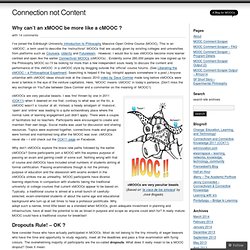
I’ve joined the Edinburgh University Introduction to Philosophy Massive Open Online Course (MOOC). This is an ‘xMOOC’, a term used to describe the ‘instructivist’ MOOCs that are usually given by existing colleges and universities from platforms such as Coursera, Udacity and Futurelearn. However, I would like to see xMOOCs become more learner centred and open like the earlier Connectivist MOOCs (cMOOCs) . Evidently some 260,000 people are now signed up for the Philosophy MOOC so I’ll be looking for more than a few independent souls ready to discuss the content and performance of this xMOOC in a cMOOC style by blogging outside the ‘official’ course forums.
(See Liberating the xMOOC – a Philosophical Experiment. cMOOCs are very peculiar beasts. Why don’t xMOOCs explore the brave new paths followed by the earlier cMOOCs? Dropouts Rule! Now consider those who have actually participated in MOOCs. Like this: Like Loading... xMOOC vs. cMOOC - MOOC Pedagogy. I only learned recently that I’ve not been enrolled in MOOC classes at all, but have instead been involved with something called an xMOOC.
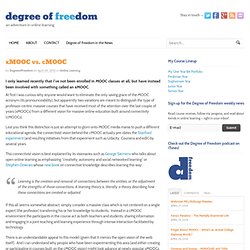
At first I was curious why anyone would want to eliminate the only saving grace of the MOOC acronym (its pronounceability), but apparently two variations are meant to distinguish the type of professor-centric massive courses that have received most of the attention over the last couple of years (xMOOCs) from a different vision for massive online education built around connectivity (cMOOCs). Lest you think this distinction is just an attempt to glom onto MOOC media mania to push a different educational agenda, the connectivist vision behind the cMOOC actually pre-dates the Stanford experiment (and resulting initiatives from that experiment such as Udacity, Coursera and edX) by several years. Learning is the creation and removal of connections between the entities, or the adjustment of the strengths of those connections. 1. 2. 3. 4. 5. ABOUT. I spent last year immersed in an unusual educational experiment.
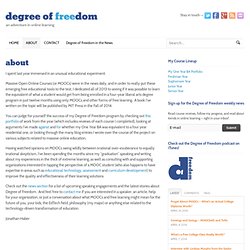
Massive Open Online Courses (or MOOCs) were in the news daily, and in order to really put these emerging free educational tools to the test, I dedicated all of 2013 to seeing if it was possible to learn the equivalent of what a student would get from being enrolled in a four-year liberal arts degree program in just twelve months using only MOOCs and other forms of free learning. A book I’ve written on the topic will be published by MIT Press in the Fall of 2014.
You can judge for yourself the success of my Degree of Freedom program by checking out this portfolio of work from the year (which includes reviews of each course I completed), looking at arguments I’ve made against and for whether my One Year BA was equivalent to a four year residential one, or looking through the many blog entries I wrote over the course of the project on various subjects related to massive online education. Jonathan Haber.